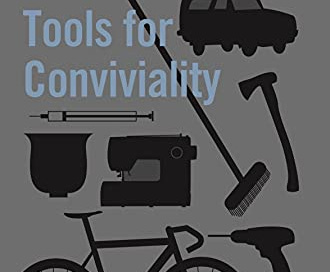Tools for Conviviality by Ivan Illich came out in 1973, but the book and other works by Illich became popular again recently. I discovered Tools a few years ago by way of a convivial hallway chat with a colleague at the university where I work. This conversation was possible because our university (thankfully) never embraced online education during the pandemic. While other institutions across Japan and the world were running great big experiments in remote teaching (with predictably terrible results), mine mostly allowed for the continuation of in-person classes on our physical campuses. It is this fortunate state of affairs that made the occasional hallway conversation possible—even in mid-2021—and led to my (re)discovery of Illich’s work.
As I remember it, my colleague and I were discussing the strange times we were then living through. I was probably going on and on about the global pharmaceutical industry’s history of criminal fraud and its well-documented capture of regulatory bodies in the US. Or maybe I was bemoaning the hyperbolic COVID fear-mongering I was still seeing in news.
Anyways, it was at this time that my colleague suggested that Tools for Conviviality might be a good read.
I recalled reading an essay by Illich many years ago in a college class but remembered next to nothing about it. But I ordered a copy of Tools for Conviviality right away, and when I started reading it, I quickly saw why Illich’s star was rising again. Though the book is more than fifty years old, it seemed to speak to our times.
Illich’s writing seems to have been prescient in the way that Eisenhower’s famous farewell address was. But whereas Eisenhower warned about the emerging dominance of the military-industrial complex in the US, Illich focused mainly on two other emerging industrial complexes: the medical-industrial complex and the educational-industrial complex.
About the intersection of the political realm with medicine, Illich wrote:
Each party promises more funds to doctors, hospitals, and drugstores. Such promises are not in the interest of the majority . . . More funds will strengthen the hold of the health industry over public resources and heighten its prestige and arbitrary power. Such power in the hands of a minority will produce only an increase in suffering and a decrease in personal self-reliance. More money will be invested in tools that only postpone unavoidable death and in services that abridge even further the civil rights of those who want to heal each other. More money spent under the control of the health profession means that more people are operationally conditioned into playing the role of the sick, a role they are not allowed to interpret for themselves.
It’s hard to read that quote without thinking of what just happened during the “global pandemic.” But Illich could hardly have imagined how the problems he predicted would be amplified by the media landscape of the 2020s. Faced with a respiratory virus survivable by 99% of healthy people under 70 years of age1, public health messengers implored us to stop thinking for ourselves and to simply trust their approved experts for the solutions they had on offer.
Predictably, however, much of the advice that “experts” and health bureaucrats handed down—which was amplified on social media—has not aged well. Nowadays, self-important media outlets like The New York Times like to opine about the devastating toll of “learning loss,” but they are much less forthcoming about their own role in fanning irrational levels of fear and anxiety that certainly informed decisions on school closures and “remote learning.”
News media conglomerates—now deeply intertwined in the internet’s attention economy—knew that fear-based messaging would produce clicks: sensationalism always sells. And since fear is socially contagious, souped-up headlines, images of ICU patients and ambulances, and articles promoting the latest alarmist junk science served their click-bait business models very well in 2020 and 2021.



Less commonly reported at the time was the fact that the pandemic constituted the largest upwards transfer of wealth ever recorded. And on the specifics of the larger story of cui bono—who specifically happened to benefit from the pandemic—the corporate media has remained almost entirely silent. Those of us skeptical enough to think that maybe, just maybe this massive wealth transfer did not come about entirely by coincidence have needed to find independent journalists on platforms like this one to learn the sordid details:
Okay, back to Ivan and his tools.
Illich saw the same problems in formalized mass education that he saw in health care: when institutions reach a certain scale they tend to stop working for their purported purposes and instead become wholly dedicated to simply perpetuating themselves.
This was his main critique of industrial-age education detailed in his other well-known book, Deschooling Society. Just as the medical industry ends up creating a perverse symbiosis between health professionals as industrial producers and patients as industrial consumers, Illich shows how contemporary education tends to pervert the natural processes of learning into that which must be done within rigid institutional boundaries to have societal value. He wrote:
“School is an institution built on the axiom that learning is the result of teaching. And institutional wisdom continues to accept this axiom, despite overwhelming evidence to the contrary. We have all learned most of what we know outside school. Pupils do most of their learning without, and often despite, their teachers."
I am a teacher, and I recognize that this quote may be difficult for some in my position to swallow. But I actually find it liberating: from this perspective, the teacher’s job becomes more about helping to create the right conditions for learning than force-feeding content to students. That is, teaching becomes a practice (or art) of enabling natural processes of discovery to unfold. This takes some pressure off, but we teachers also must contend with another significant problem that Illich elucidates: years of compulsory schooling often leave students more accustomed to rule-following passivity than naturalistic exploratory learning. Many students have been programmed to “get with the program” instead of naturally exploring and questioning the world around them to make sense of it.
Illich wanted a society that would allow everyone to take control of their own learning experiences, and as an antidote to the disempowerment and dehumanization of mass-scale institutional schooling and medicine, he offered his concept of "tools for conviviality."
Illich’s notion of “tools for conviviality” revolves around the idea that everyday tools and systems can empower individuals, enhance community life, and promote a balanced relationship with the natural world around us. While Illich didn't provide an exhaustive list of specific tools, he did discuss the types of tools and practices that would be considered “convivial.”
In the realm of education, Illich advocated for the creation of informal learning networks and resources that empower individuals to pursue education according to their interests. This could involve community-based learning, sites for skill-sharing, and mentorship programs. Open learning (“maker”) spaces and educational programs in libraries, parks, and gymnasiums all comport with Illich’s vision.
Illich thought the technology of his day was perfectly adequate for the creation of the kind of learning networks he envisioned. In fact, perhaps Illich deserves credit for the prototypical idea behind meetup.com. In Deschooling Society, he wrote:
Let me give, as an example of what I mean, a description of how an intellectual match might work in New York City. Each man, at any given moment and at a minimum price, could identify himself to a computer with his address and telephone number, indicating the book, article, film, or recording on which he seeks a partner for discussion. Within days he could receive by mail the list of others who recently had taken the same initiative. This list would enable him by telephone to arrange for a meeting with persons who initially would be known exclusively by the fact that they requested a dialogue about the same subject.
In a world of high-speed Wi-Fi, smart watches, and VR goggles, Illich’s vision of using the simple telecommunications tools of his day to facilitate convivial dialogue seems quaint, but his argument has been made in various ways by many other great thinkers. Intellectual heroes of mine such as Lewis Mumford, Neil Postman, and Wendell Berry all had similar messages. To me, a common theme from all these writers is that we should use good tools whose designs foster positive humanistic values while avoiding those that disconnect us from good relations with each other and the natural world we inhabit.
The main challenge today rests in resisting the slick promises of speed, efficiency, and convenience from companies trying to sell us “solutions” to problems we didn’t know we had. Yes, sometimes speed, efficiency, and convenience are important, but certainly not always. Many things in life are just fine, or even much better, when they are slow and circuitous.
This reminds me of something Tom Waits includes on his “Wit & Wisdom” page. He quotes Jim Jarmusch, saying, “Fast, Cheap, and Good . . .pick two. If it’s fast and cheap it won’t be good. If it’s cheap and good it won’t be fast. If it’s fast and good it won’t be cheap.”
That’s some decent folk wisdom about how all consumer and lifestyle choices involve trade-offs. For Illich, the trick in choosing the right tools was to make the trade-offs that we want to make, not necessarily the ones that industrial capitalism wants for us. Though he admitted to not being entirely satisfied with the term, Illich settled on “conviviality” as his measuring stick for evaluating the relative goodness of society’s tools.
Conviviality works for me, and his book is a good one. Conveniently, Tools for Conviviality is now available online, but after reading Illich, I’d like to recommend getting a copy of the paper version I bought. Paper books are themselves tools for conviviality that can be used in very positive ways. For one, they can serve as conversation pieces. So, if you are interested, why not approach your local library or bookseller to see if you can find a copy of this venerable old classic!
Coda: A few days after finishing this post, I received an email from a (great) mentor of mine, Dr. Deryn Verity, who now works at Penn State University (where Illich also worked for a period), and whose late brother, John Verity, was an avid student of Illich’s work. Deryn sent me information about an online community called “Thinking After Illich” that continues to explore Ivan Illich’s work and legacy. There, I came across a link to a symposium on Illich which in turn led me to the discovery of a fascinating article that was written in Canada in April of 2020 by Illich scholar David Cayley. Amazingly, Cayley uses Illich’s ideas at that early moment in the pandemic to warn of what was to come if Canada continued down the path it had started along. He was tragically correct. The essay is quite long, but it’s riveting, and fascinating to read now after all that has transpired. If you are interested, please access Mr. Cayley’s wonderful article here.
If you made it this far, thanks very much for reading! Comments, constructive criticism, and pushback on anything I write is always very welcome. If you haven’t subscribed and want to get emailed when I post, please join the list.
Which is not to say that those over 70 did not deserve protection. They certainly did—just not at the expense of everyone else in society, particularly the young and healthy who had their whole lives in front of them and suffered immensely because of COVID countermeasures in many societies. Also, to the argument that COVID’s survivability was not well-known at the time: this is simply false. Many researchers conducted early seroprevalence studies which allowed for preliminary infection fatality rate estimates. Some of these top scientists created The Great Barrington Declaration (signed by scores of other top scientists and almost a million people in total), which advocated for focused protection for those most vulnerable to COVID-19 . Though their approach comported with the canonical tenets of public health in the pre-covid era, these researchers were suppressed and slandered by public health officials and the corporate press.







Always glad to have someone else speaking up for the incredibly work of Ivan Illich, Peter! Illich's work remains pivotal in my own philosophy, but it is a challenge to get folks to appreciate why these ideas are so important. The transformation of thought during Illich's lifetime makes it far, far harder to appreciate his critique afterwards, although I entirely agree with you here that it dovetails with Heidegger's concerns very well.
With unlimited love,
Chris.
Thank you for the deft introduction. I'll be ordering a copy!